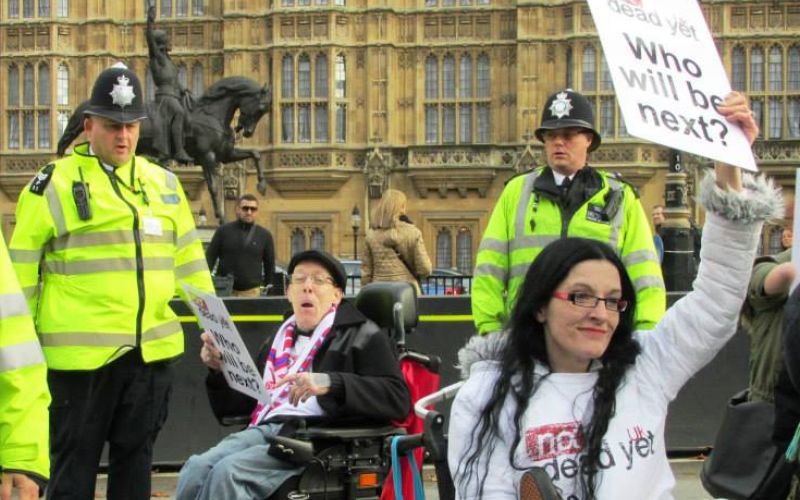Disabled researchers who interviewed both opponents of legalising assisted suicide and those in favour of new laws have found “a surprising amount of common ground” between the two groups.
The research, published by the national service-user and disabled people’s network Shaping Our Lives (SOL), found that “oversimplified” media reporting on the complex arguments for and against legalisation was making it difficult to hold a proper debate.
The report, Assisted Dying: Developing The Debate, concludes that the two camps often share areas of concern and interest, which should form the basis for further public discussion.
The report says that debate has so far has been “highly polarised” and “lacking in full discussion of the complexities and practicalities” of the issue, and there has “not been much room for those with outwardly opposing positions to explore common ground”.
The 14 people interviewed in depth about their views included seven who were in favour of legalisation and seven who were not.
The report’s authors say in the report: “Participants on both sides felt that, to date, the quality of debate had been compromised or stifled by extreme polarization, emotionalism and media misrepresentation or over-simplification.”
And they conclude that their research shows “a tentative basis for further, potentially constructive discussions”.
Some of the common ground was found in discussions on the psychological aspects of pain, suffering, death and dying; the role of “compassion and values” in the debate; and the importance of individual control and dignity at the end of life.
One common theme was the inadequacy of care and support for terminally-ill people, while there was recognition that the debate was “taking place in an ‘unequal society'”.
Those in favour and those opposed to new laws agreed that any proposed legislation would have to “carefully” consider and plan the “practical aspects of assisted dying and the processes and safeguards needed”.
One respondent who supported a change in the law said that although it was “impossible to eliminate risk”, the potential “unintended consequences” of legalisation should be considered.
The majority of those who opposed legalisation were concerned about “the potential for forms of coercion by family members”, which was also acknowledged by some of those in favour of a change in the law.
Participants on both sides accepted that it would be “very difficult to assess the influence of ‘feeling a burden’ on family or friends on the decision to request assisted dying”.
The report adds: “Others from both sides of the debate thought that feelings of ‘being a burden’ were partly caused by inadequate provision of social care and support for terminally ill, older and disabled people and their carers.”
Most of the opponents to legalisation were “particularly concerned about older people with terminal illness and the nature of power and control in their inter-familial relationships, particularly that relating to money or material gain”.
One of those in favour of assisted suicide accepted that legalisation could provide “a powerful set of circumstances for exploitation”, particularly of older people who are terminally ill.
And three of those who supported a change in the law said that “medical assessment of disease progression and prognosis was not exact and medical progress meant that there could be a possibility that, at any one time, a treatment could become available to prolong life or relieve pain”.
Several of those who supported legalisation said they believed that “euthanasia”, “assisted suicide” and “assisted dying” were all different practices, and that this needed to be highlighted.
The report concludes: “All participants had a wish to find the best way forward with compassion for people who are terminally ill, regardless of being for or against legalising assisted dying.”
Those ho took part included palliative care professionals, people from older people’s care and support organisations, older and disabled people, and individuals from academic, social work and policy backgrounds.
The report’s three authors all have experience of using mental health services.
Sarah Carr is associate professor of mental health research at Middlesex University and vice-chair of the National Survivor User Network; Peter Beresford is emeritus professor of social policy at Brunel University, professor of citizen participation at the University of Essex, and co-chair of SOL; and Tina Coldham is a service-user activist, chair of the Social Care Institute for Excellence’s co-production network, and an honorary visiting fellow in the University of York’s department of social policy and social work.
Beresford said: “There are distinct divisions on whether or not it would be right to change the law, but we can see from many of the people we interviewed, that the issues are far more complex than much of the public debate that we have had so far has allowed.
“Death and dying is a core issue for human beings and public debate must reflect all our sensitivity and intelligence.
“One important conclusion from this research is that participants appreciated that we were conducting it in the first place – the majority of people from both sides felt they were being given a valuable opportunity to explore common ground in relation to the complexities and practicalities of assisted dying.”

 Disabled peers plan to ‘amend, amend, amend, amend, amend’ after assisted dying bill reaches Lords
Disabled peers plan to ‘amend, amend, amend, amend, amend’ after assisted dying bill reaches Lords This bill opens the door to scandal, abuse and injustice, disabled activists say after assisted dying bill vote
This bill opens the door to scandal, abuse and injustice, disabled activists say after assisted dying bill vote Absence of disabled people’s voices from assisted dying bill has been ‘astonishing’, says disabled MP
Absence of disabled people’s voices from assisted dying bill has been ‘astonishing’, says disabled MP